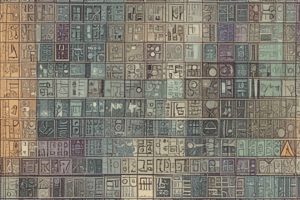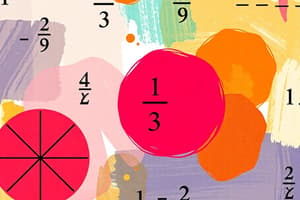Podcast
Questions and Answers
What is the first step in simplifying a fraction?
What is the first step in simplifying a fraction?
- Divide numerators and denominators
- Cancel out common factors (correct)
- Multiply numerators and denominators
- Add numerators and denominators
How do you convert a percentage to a decimal?
How do you convert a percentage to a decimal?
- Divide by 100 (correct)
- Add 100
- Subtract 100
- Multiply by 100
What is the formula to find the circumference of a circle?
What is the formula to find the circumference of a circle?
- C = πr
- C = 2πd
- C = πd
- C = 2πr (correct)
What is the simplest form of the ratio 12:18?
What is the simplest form of the ratio 12:18?
What is the quadratic formula used to solve?
What is the quadratic formula used to solve?
What is the sine of an angle in a right-angled triangle?
What is the sine of an angle in a right-angled triangle?
What is the purpose of a histogram?
What is the purpose of a histogram?
What is the probability of an event that is certain to happen?
What is the probability of an event that is certain to happen?
Flashcards are hidden until you start studying
Study Notes
Numbers and Operations
- Fractions:
- Simplification: cancel out common factors
- Addition and subtraction: find common denominator
- Multiplication: multiply numerators and denominators separately
- Division: invert and multiply
- Decimals and Percentages:
- Conversion: move decimal point to convert between decimals and percentages
- Percentage increase/decrease: calculate percentage change
- Ratios and Proportions:
- Simple ratios: reduce to simplest form
- Equivalent ratios: multiply/divide by same number
- Proportional calculations: set up proportion and solve
Algebra
- Linear Equations:
- Simplify and solve: add/subtract same value to both sides, multiply/divide both sides by same value
- Graphical representation: x-axis and y-axis
- Quadratic Equations:
- Factorization: solve by factorizing
- Quadratic formula: use when factorization is not possible
- Formulae and Transposition:
- Rearrangement: transpose formula to isolate specific variable
- Substitution: substitute given values into formula
Geometry and Trigonometry
- Points, Lines, and Angles:
- Properties of points, lines, and angles
- Types of angles: acute, obtuse, right, straight, reflex
- Triangles:
- Properties: congruent, similar, right-angled
- Pythagorean theorem: a^2 + b^2 = c^2
- Trigonometric ratios: sine, cosine, tangent
- Circles:
- Properties: center, radius, circumference, diameter
- Circumference and area calculations
Graphs and Charts
- Types of Graphs:
- Linear: straight line
- Non-linear: curved line
- Quadratic: parabola
- Graphical Representation:
- Plotting points: x-axis and y-axis
- Interpreting graphs: identify trends, maxima, and minima
Statistics and Probability
- Descriptive Statistics:
- Mean, median, mode
- Range and interquartile range
- Probability:
- Basic concepts: event, experiment, probability scale
- Calculating probability: theoretical and experimental probability
Numbers and Operations
- A fraction can be simplified by canceling out common factors between the numerator and denominator.
- To add or subtract fractions, find a common denominator and then add or subtract the numerators.
- To multiply fractions, multiply the numerators and denominators separately.
- To divide fractions, invert the second fraction and then multiply.
- Decimals and percentages can be converted by moving the decimal point.
- To calculate a percentage increase or decrease, find the percentage change.
Algebra
- Linear equations can be simplified and solved by adding or subtracting the same value to both sides, and then multiplying or dividing both sides by the same value.
- Linear equations can be represented graphically on the x-axis and y-axis.
- Quadratic equations can be solved by factorization or by using the quadratic formula when factorization is not possible.
- Formulae can be rearranged to isolate a specific variable by transposing the formula.
- Substitution involves substituting given values into a formula.
Geometry and Trigonometry
- Points, lines, and angles have specific properties, and there are different types of angles, including acute, obtuse, right, straight, and reflex angles.
- Triangles can be congruent, similar, or right-angled, and the Pythagorean theorem states that a^2 + b^2 = c^2.
- Trigonometric ratios include sine, cosine, and tangent.
- Circles have properties such as a center, radius, circumference, and diameter, and circumference and area can be calculated.
Graphs and Charts
- Linear graphs have a straight line, non-linear graphs have a curved line, and quadratic graphs have a parabola shape.
- Graphs can be plotted by using points on the x-axis and y-axis, and graphs can be interpreted to identify trends, maxima, and minima.
Statistics and Probability
- Descriptive statistics include calculating the mean, median, mode, range, and interquartile range.
- Probability involves understanding events, experiments, and the probability scale, and probability can be calculated theoretically or experimentally.
Studying That Suits You
Use AI to generate personalized quizzes and flashcards to suit your learning preferences.




